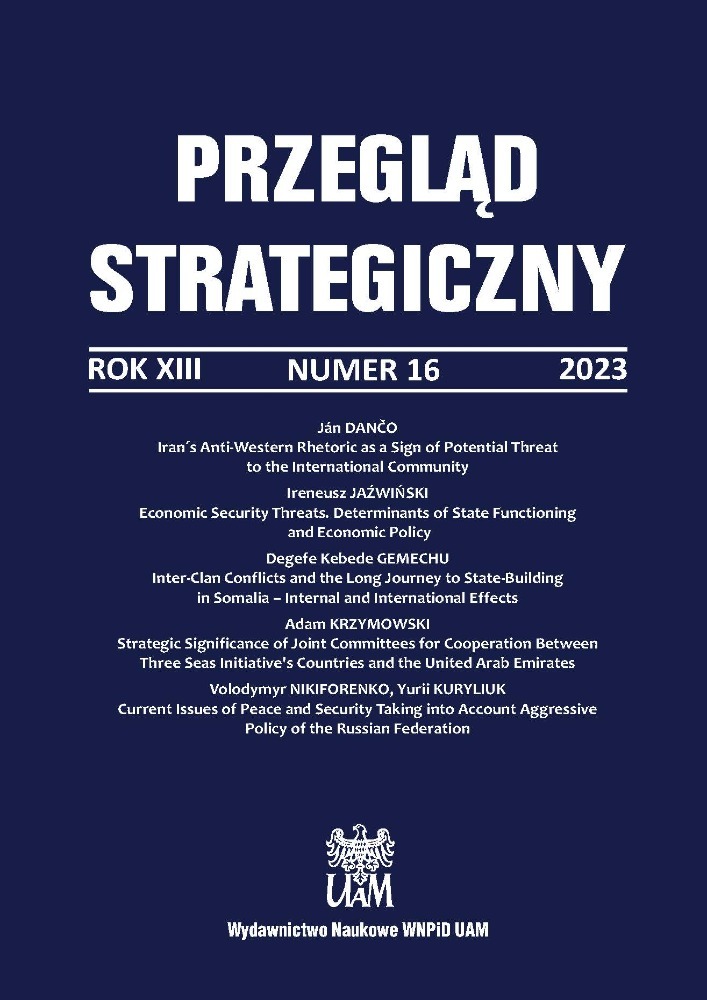Abstract
The aim of this article is to analyse the disinformation activities of the Russian Federation as well as to analyse the content of pro-Kremlin disinformation messages present in the Polish information space during the first year of Russia’s full-scale aggression in Ukraine. The research area is Polish-language internet portals and social media. The research period covers one calendar year, from 24 February 2022 to 23 February 2023. In the course of the research conducted, the following methods were used: content and content analysis and the analysis of the data found. The following research questions were formulated in order to realise the purpose of the deliberations conducted: What media were used to spread disinformation? What topics did the content of false narratives focus on? What goals did disinformers choose in the case of the Polish media space?
Based on the research questions, research hypotheses were formulated. It was assumed that disinformation activities primarily covered the Polish internet and social media space. It was assumed that anti-Ukrainian and anti-refugee themes dominated among the false messages. It was assumed that the disinformers’ chosen objectives were to create aversion in Poles towards refugees and to create anxiety and fear of war. As a result of the analyses, all hypotheses were positively verified.
References
Aby dostać stypendium, wystarczy być Ukraińcem? Fałsz! (2023), https://demagog.org.pl/fake_news/aby-dostac-stypendium-wystarczy-byc-ukraincem-falsz/ (30.03.2023).
Council Regulation (EU) 2022/350 of 1 March 2022 amending Regulation (EU) No 833/2014 concerning restrictive measures in view of Russia’s actions destabilising the situation in Ukraine (2022), https://eur-lex.europa.eu/eli/reg/2022/350/oj (03.11.2023).
Dowództwo Komponentu Wojsk Obrony Cyberprzestrzeni (2023), Ukraina 2022. 10 miesięcy rosyjskiej propagandy, cz. I, https://www.wojsko-polskie.pl/woc/articles/aktualnosci-w/ukraina-2022-10-miesiecy-rosyjskiej-propagandy/ (23.03.2023).
European Commission (2018), A multi-dimensional approach to disinformation. Report of the independent High level Group on fake news and online disinformation, https://cadmus.eui.eu/bitstream/handle/1814/70297/DeCockB_2018?sequence=1&isAllowed=y (16.02.2023).
Fraser M. (2022), Skąd wzięła się akcja #StopUkrainizacjiPolski na Twitterze?, https://cyberdefence24.pl/social-media/skad-wziela-sie-akcja-stopukrainizacjipolski-na-twitterze (26.03.2023).
Global Engagement Center (2020), GEC Special Report: Pillars of Russia’s Disinformation and Propaganda Ecosystem, https://www.state.gov/russias-pillars-of-disinformation-and-propaganda-report/ (23.03.2023).
Gov.pl (2022), Medialne marionetki Putina, https://www.gov.pl/web/sluzby-specjalne/medialne-marionetki-putina (23.03.2023).
Instytut Badań Internetu i Mediów Społecznościowych (2022a), Komunikat ws. prorosyjskich ataków informacyjnych 24.02.22, https://ibims.pl/komunikat-ws-prorosyjskich-atakow-informacyjnych-24-02-22/ (23.03.2023).
Instytut Badań Internetu i Mediów Społecznościowych (2022b), Komunikat ws. prorosyjskich grup prowadzących działania dezinformacyjne 25.02.22, https://ibims.pl/komunikat-ws-prorosyjskich-grup-prowadzacych-dzialania-dezinformacyjne-25-02-22/ (24.03.2023).
Instytut Badań Internetu i Mediów Społecznościowych (2022c), Nuklearna groźba Putina – atomowy blef czy realne zagrożenie?, https://ibims.pl/nuklearna-grozba-putina-atomowy-blef-czy-realne-zagrozenie/ (25.03.2023).
Instytut Badań Internetu i Mediów Społecznościowych (2022d), Komunikat 21-03-22 ws. sytuacji komunikacyjnej tematu #uchodźcy, https://ibims.pl/komunikat-21-03-22-ws-sytuacji-komunikacyjnej-tematu-uchodzcy/ (25.03.2023).
Instytut Badań Internetu i Mediów Społecznościowych (2022e), Komunikat ws. dezinformacji ws. sytuacji na Ukrainie w internecie, https://ibims.pl/komunikat-ws-szerzenia-dezinformacji-ws-sytuacji-na-ukrainie-w-polskiej-przestrzeni-internetowej/ (25.03.2023).
jsx, tw (2022), Wirtualna Polska, Interia i Polska Press wyłączyły komentarze przy tekstach o agresji Rosji na Ukrainę, https://www.wirtualnemedia.pl/artykul/agresja-rosja-na-ukraina-wirtualna-polska-wylaczyla-komentarze-newsy-artykuly-interia-blokada (17.02.2023).
Legucka A. (2020), Dezinformacja jako element wojny informacyjnej Federacji Rosyjskiej –założenia i efektywność, “Sprawy Międzynarodowe”, Vol. 73, No. 4: 159–186. DOI: https://doi.org/10.35757/SM.2020.73.4.06
Łukasik-Turecka A., Malužinas M. (2023), Digital Disinformation During the 2020 Parliamentary Elections in Lithuania, in: Digital Communication and Populism in Times of Covid-19. Cases, Strategies, Example, (eds.) M. Musiał-Karg, O. G. Luengo, Cham: 75–89. DOI: https://doi.org/10.1007/978-3-031-33716-1_6
Musiał-Karg M., Łukasik-Turecka A. (2023), Disinformation in the media space during the war in Ukraine: how did Kremlin’s fake news blame Ukraine, the USA and NATO for the invasion, in: The War in Ukraine. (Dis)information – Perception – Attitudes, (eds.) M. Musiał-Karg, N. Lubik-Reczek, Berlin: 13–38. DOI: https://doi.org/10.3726/b20643
Nehring Ch. (2017), Russische (Des-)Informationspolitik. Bruch oder Kontinuität?, „Zeitschrift für Außen- und Sicherheitspolitik”, No. 10: 441–451, https://link.springer.com/article/10.1007/s12399-017-0672-7 (22.03.2023). DOI: https://doi.org/10.1007/s12399-017-0672-7
Raport Demagoga i IMM: Antyukraińska propaganda w styczniu (2023), https://demagog.org.pl/analizy_i_raporty/raport-demagoga-i-imm-antyukrainska-propaganda-w-styczniu/ (29.03.2023).
Reklama w polskim metrze zachęca do walki w Ukrainie? Fałsz! (2023) https://demagog.org.pl/fake_news/reklama-w-polskim-metrze-zacheca-do-walki-w-ukrainie-falsz/ (30.03.2023).
Wardle C. (2017), Information Disorder: Toward an interdisciplinary framework for research and policy making, Council of Europe Report DGI, https://rm.coe.int/information-disorder-report-version-august-2018/16808c9c77 (25.03.2023).
W krainie kolorowych matrioszek – jak działa rosyjska dezinformacja? (2022), https://demagog.org.pl/analizy_i_raporty/w-krainie-kolorowych-matrioszek-jak-dziala-rosyjska-dezinformacja/?fbclid=IwAR3Rmise8qnN0cpvyFkCZdTQr-R7I3TXygKeAG1Y7afXz49nUq1_49ONV2g&cn-reloaded=1 (22.03.2023).
License
Copyright (c) 2023 Agnieszka Łukasik-Turecka

This work is licensed under a Creative Commons Attribution-ShareAlike 4.0 International License.

